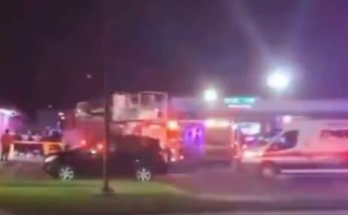
Just Before the Tragedy: Charlie Kirk’s Final Call Leaves America Stunned
On a crisp September afternoon at Utah Valley University, Charlie Kirk stood beneath a white tent emblazoned with the words “The American Comeback.” It was the first stop of his fall campus tour—a series of events designed to ignite debate, challenge liberal orthodoxy, and rally young conservatives around his vision for America. But no one in the crowd of thousands could have imagined that this would be his final call.
Kirk, 31, was in his element. The founder of Turning Point USA, he had spent over a decade cultivating a movement that blended youthful energy with hardline conservatism. His signature “Prove Me Wrong” debates had become viral sensations, drawing both admiration and outrage. That day, he was doing what he loved most: engaging students, provoking thought, and defending his beliefs with unflinching confidence.
A Voice That Shaped a Generation
Charlie Kirk wasn’t just a commentator—he was a force. Since launching Turning Point USA at age 18, he had become one of the most influential voices in right-wing politics. His reach extended from college campuses to Capitol Hill, from podcast platforms to presidential rallies. He was a close ally of President Trump, a frequent guest on conservative media, and a tireless advocate for what he called “American renewal.”
To his supporters, Kirk was a truth-teller in hostile territory, a man willing to face down cancel culture and ideological conformity. To his critics, he was a provocateur who thrived on division. But love him or loathe him, his impact was undeniable.
The Final Moments
As Kirk fielded questions from students, the atmosphere was electric. He spoke about faith, patriotism, and the importance of standing firm in one’s convictions. He challenged the crowd to think critically, to reject what he called “the lies of the left,” and to embrace a vision of America rooted in tradition and moral clarity.
Then, in a moment that would be replayed across every screen in the country, a single shot rang out.
Kirk collapsed, struck in the neck by a bullet fired from a rooftop. Panic erupted. Students screamed and scattered. Security rushed to the scene. Kirk was transported to a nearby hospital, but the wound proved fatal. By 4:40 p.m., President Trump confirmed his death on Truth Social, calling him “the most influential voice of my generation”.
A Nation in Shock
The assassination of Charlie Kirk sent shockwaves through America. It wasn’t just the loss of a political figure—it was the brutal silencing of a voice that had come to symbolize a movement. Across social media, tributes poured in. Conservative leaders mourned. Liberal commentators expressed horror. Even those who had fiercely opposed Kirk’s views acknowledged the gravity of the moment.
Vice President JD Vance accompanied Kirk’s widow, Erika, and their children back to Phoenix aboard Air Force Two. Erika Kirk, herself a public figure and conservative activist, delivered a powerful eulogy days later. “They killed Charlie because he preached a message of patriotism, faith, and God’s merciful love,” she said. “But they have no idea what they’ve unleashed. The cries of this widow will echo around the world like a battle cry”.
The Investigation
Authorities quickly launched a manhunt. Surveillance footage showed the suspect fleeing across the roof and into nearby woods. A high-powered rifle, palm print, and shoe impression were recovered. Within days, 22-year-old Tyler Robinson was arrested and charged with aggravated murder.
The motive remains unclear. Was it political? Personal? A tragic collision of ideology and instability? Investigators are still piecing together the puzzle, but the implications are chilling. Kirk’s death is part of a disturbing trend—an escalation of political violence that has haunted America in recent years.
The Legacy He Leaves Behind
Charlie Kirk’s death has galvanized his supporters. Erika Kirk vowed to continue hosting Turning Point USA events, including the upcoming AmericaFest conference. “The movement my husband built will not die,” she declared.
Turning Point USA, once a fledgling student group, is now a national powerhouse. Its influence spans media, education, and politics. Kirk’s legacy is woven into its DNA—his speeches, his debates, his unapologetic defense of conservative values.
But his death also raises urgent questions. How do we protect free speech in an age of rage? How do we foster debate without inviting violence? What does it mean to be a martyr in modern America?
A Divided Response
Not everyone mourned. Some critics pointed to Kirk’s rhetoric, arguing that his confrontational style contributed to a toxic political climate. Others condemned such reactions as victim-blaming. The debate over Kirk’s legacy is as polarized as the country he sought to influence.
Political analyst Matthew Dowd was fired from MSNBC after making controversial remarks about Kirk’s death. Comedian Jimmy Kimmel urged unity, saying, “Can we just for one day agree that it is horrible and monstrous to shoot another human?”
The tragedy has reignited conversations about security at political events, the role of media in shaping public discourse, and the dangers of ideological extremism.
A Final Call That Echoes Still
Charlie Kirk’s last words were not recorded in full. But those who were present remember the tone—urgent, passionate, defiant. He spoke of America’s future, of the need to stand firm, of the power of faith and conviction.
In death, Kirk became a symbol. To some, he is a martyr for truth and freedom. To others, a cautionary tale. But to all, his final call was a moment that stunned a nation and forced it to reckon with the cost of its divisions.


